Unit 2 What time do you go to school?单元考点精讲课件(44张PPT)
文档属性
| 名称 | Unit 2 What time do you go to school?单元考点精讲课件(44张PPT) |  | |
| 格式 | ppt | ||
| 文件大小 | 9.9MB | ||
| 资源类型 | 试卷 | ||
| 版本资源 | 人教新目标(Go for it)版 | ||
| 科目 | 英语 | ||
| 更新时间 | 2023-01-29 19:41:07 | ||
图片预览

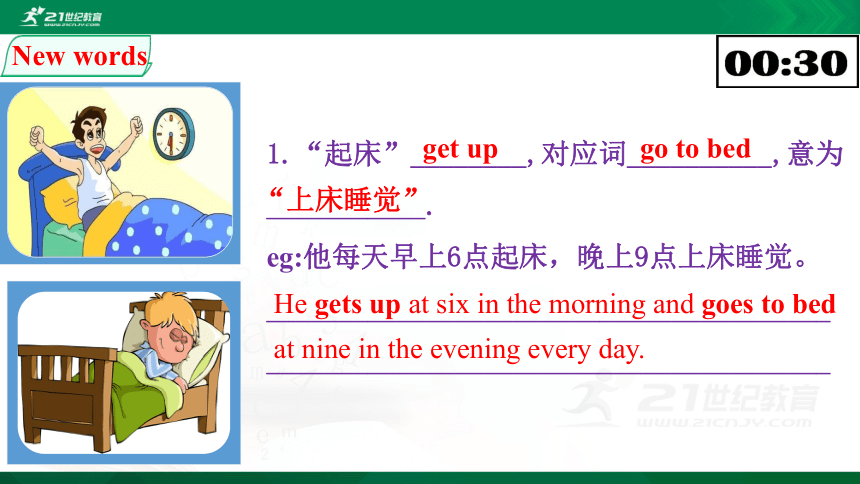
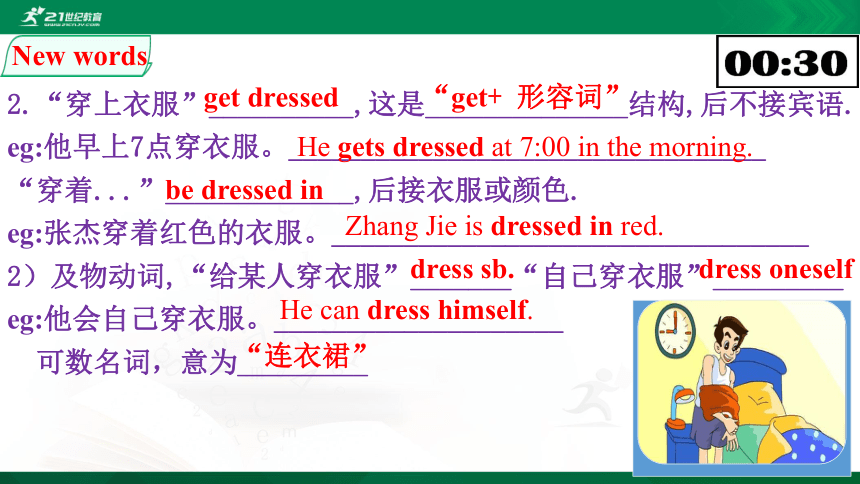
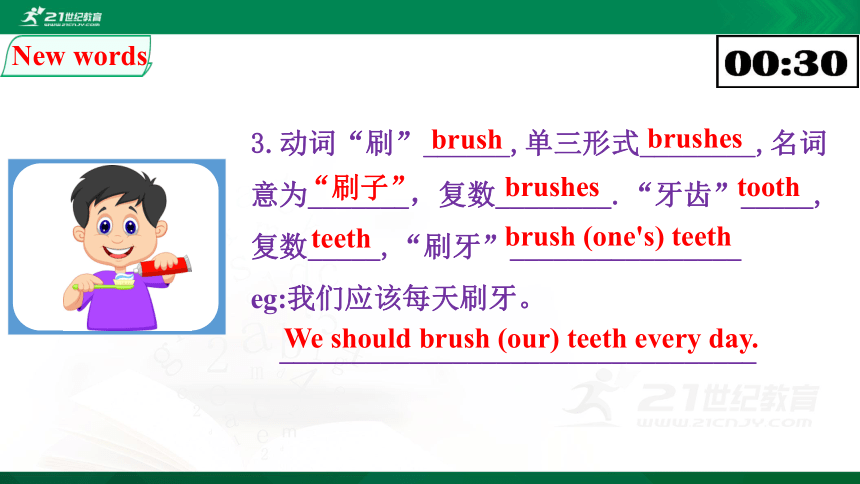
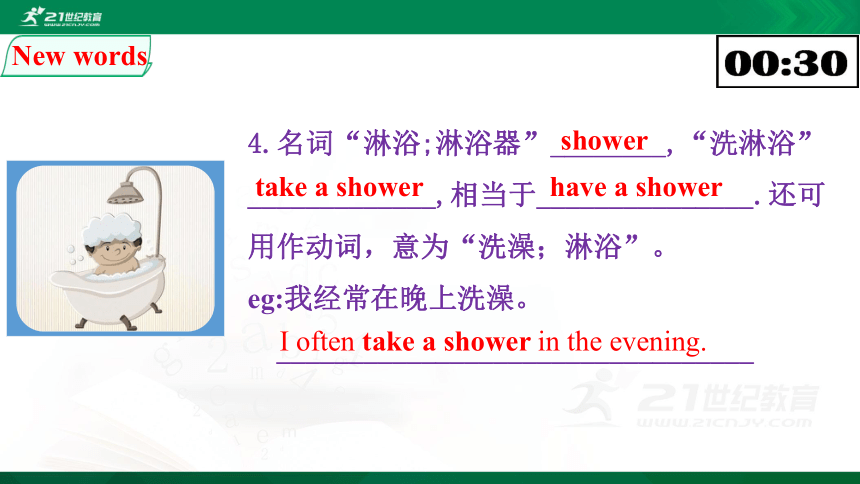
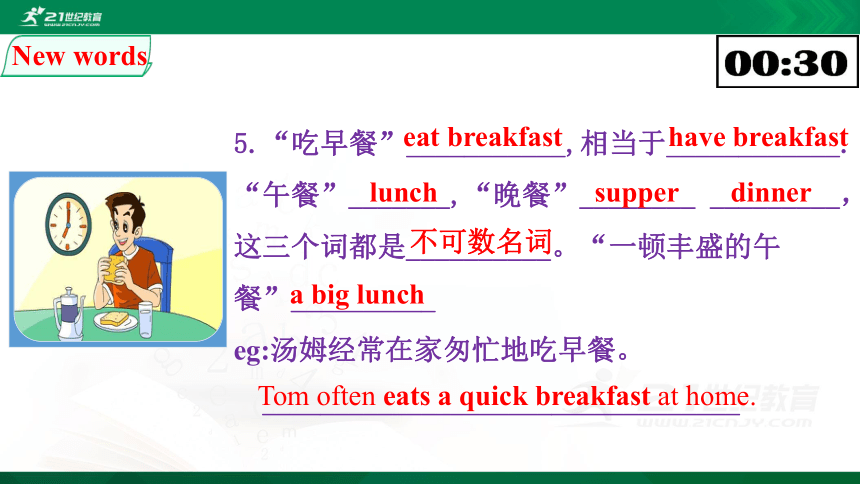
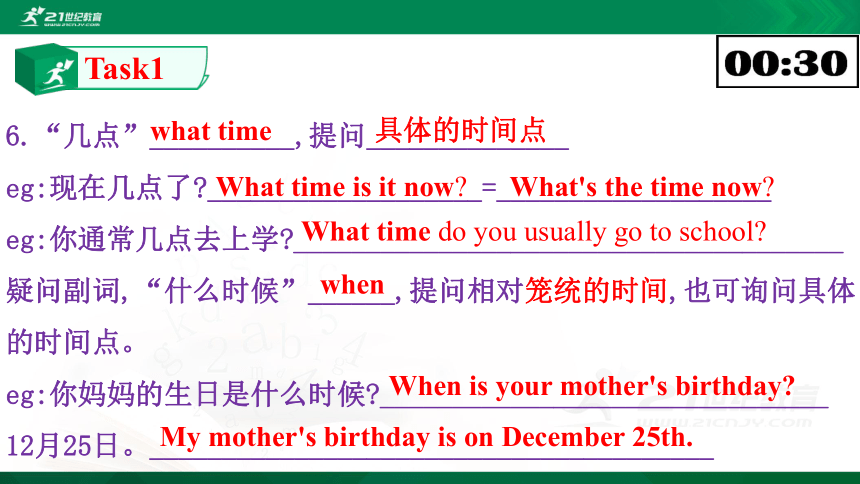
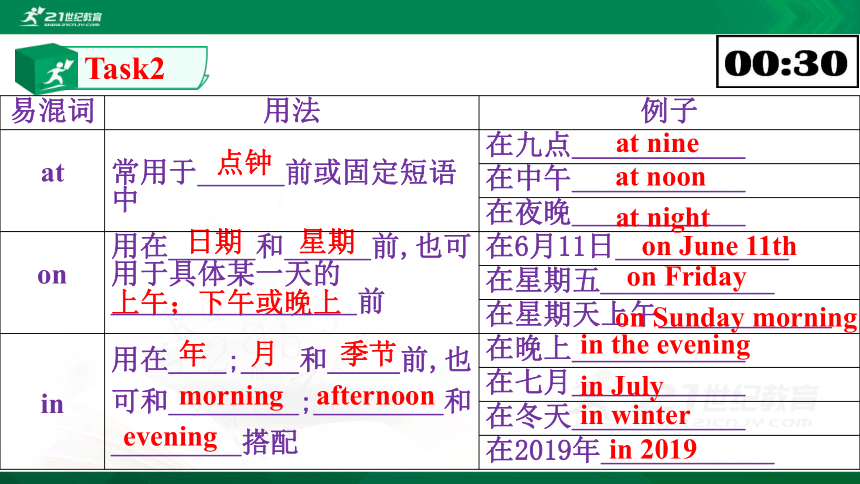
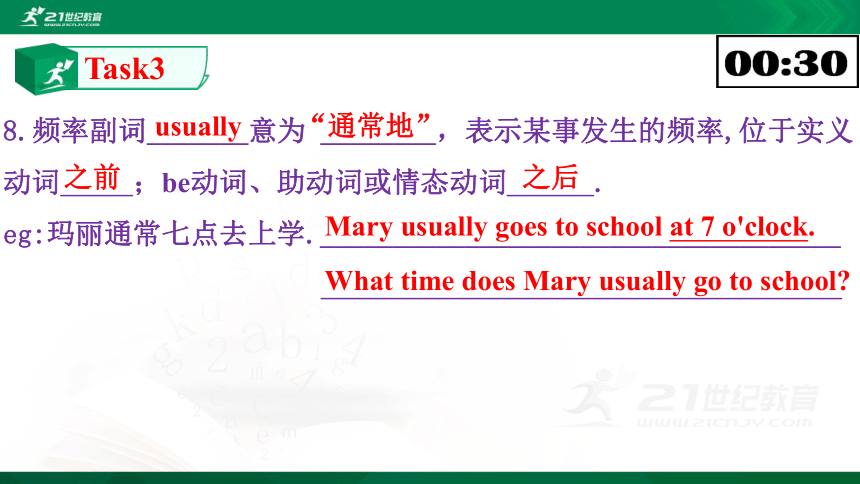
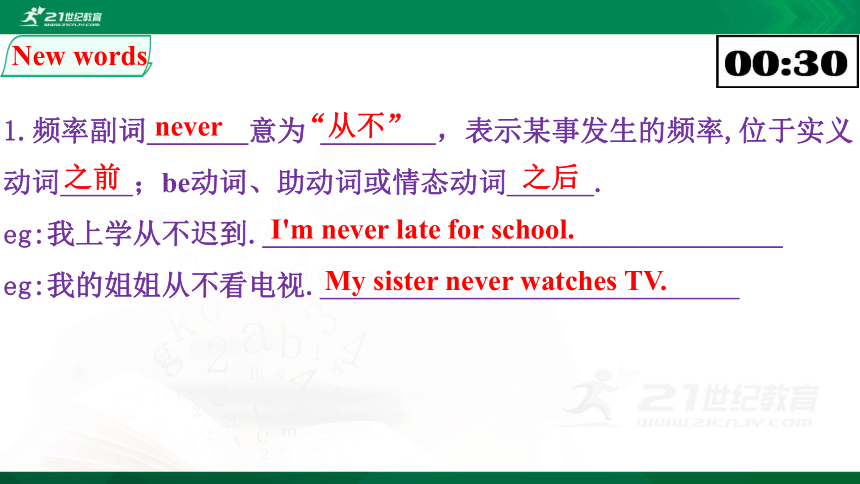
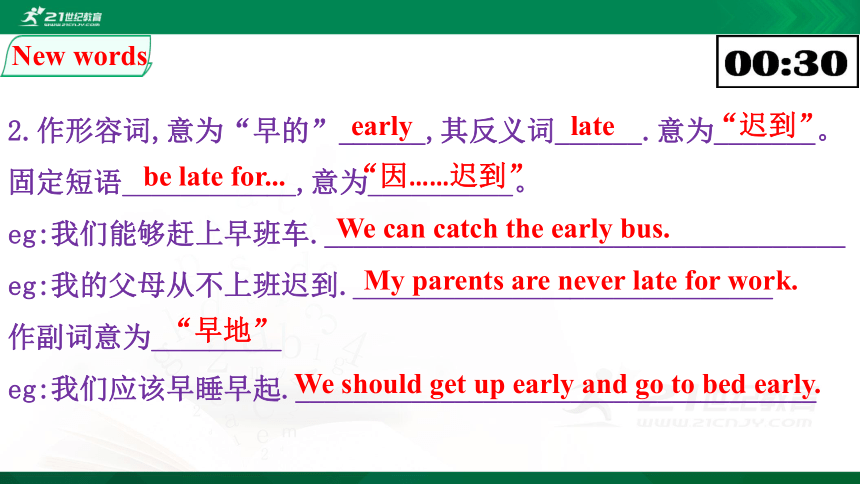
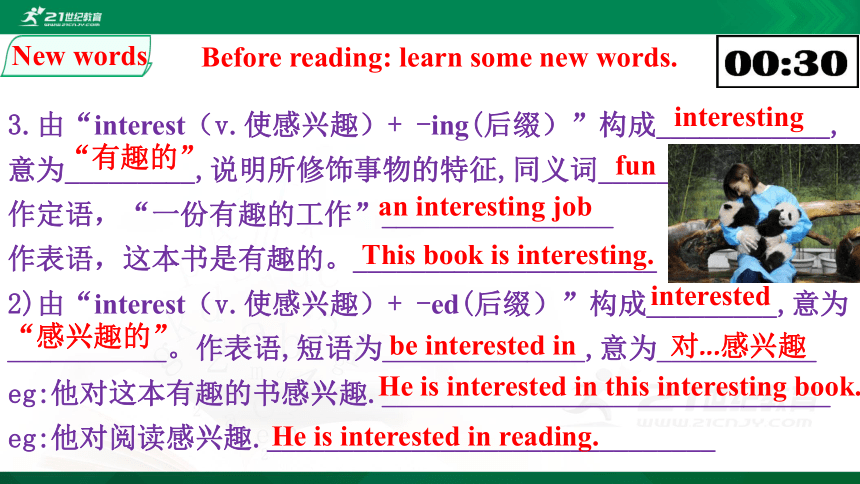
文档简介
(共44张PPT)
Unit 2 What time do you go to school
考点精讲
新目标(Go for it)版七年级下册
1.“起床”________,对应词__________,意为___________.
eg:他每天早上6点起床,晚上9点上床睡觉。_______________________________________
_______________________________________
get up
“上床睡觉”
go to bed
He gets up at six in the morning and goes to bed at nine in the evening every day.
New words
2.“穿上衣服”__________,这是______________结构,后不接宾语.
eg:他早上7点穿衣服。_________________________________
“穿着...”_____________,后接衣服或颜色.
eg:张杰穿着红色的衣服。_________________________________
2)及物动词,“给某人穿衣服”_______“自己穿衣服”_________
eg:他会自己穿衣服。____________________
可数名词,意为_________
get dressed
dress sb.
“get+ 形容词”
He gets dressed at 7:00 in the morning.
New words
be dressed in
Zhang Jie is dressed in red.
dress oneself
He can dress himself.
“连衣裙”
3.动词“刷”______,单三形式________,名词意为_______,复数________.“牙齿”_____,复数_____,“刷牙”________________
eg:我们应该每天刷牙。
_________________________________
brush
We should brush (our) teeth every day.
brushes
“刷子”
New words
brushes
brush (one's) teeth
tooth
teeth
4.名词“淋浴;淋浴器”________,“洗淋浴” _____________,相当于_______________.还可用作动词,意为“洗澡;淋浴”。
eg:我经常在晚上洗澡。
_________________________________
take a shower
I often take a shower in the evening.
have a shower
New words
shower
5.“吃早餐”___________,相当于____________.
“午餐”_______,“晚餐”________ _________,这三个词都是__________。“一顿丰盛的午餐”__________
eg:汤姆经常在家匆忙地吃早餐。
_________________________________
have breakfast
New words
eat breakfast
lunch
supper
dinner
不可数名词
a big lunch
Tom often eats a quick breakfast at home.
6.“几点”__________,提问______________
eg:现在几点了 ___________________=___________________
eg:你通常几点去上学 ______________________________________
疑问副词,“什么时候”______,提问相对笼统的时间,也可询问具体的时间点。
eg:你妈妈的生日是什么时候 _______________________________
12月25日。_______________________________________
when
具体的时间点
Task1
what time
What time do you usually go to school
When is your mother's birthday
My mother's birthday is on December 25th.
What time is it now
What's the time now
点钟
年
日期
上午;下午或晚上
Task2
星期
月
季节
morning
afternoon
易混词 用法 例子
at
常用于______前或固定短语中 在九点____________
在中午____________
在夜晚____________
on 用在______和______前,也可用于具体某一天的_________________前 在6月11日____________
在星期五____________
在星期天上午____________
in 用在____;____和_____前,也
可和_________;_________和_________搭配 在晚上____________
在七月____________
在冬天____________
在2019年____________
evening
at nine
at noon
at night
on June 11th
on Friday
on Sunday morning
in July
in the evening
in winter
in 2019
8.频率副词_______意为 ________,表示某事发生的频率,位于实义动词_____;be动词、助动词或情态动词______.
eg:玛丽通常七点去上学.____________________________________
____________________________________
usually
“通常地”
之后
之前
Task3
Mary usually goes to school at 7 o'clock.
What time does Mary usually go to school
1.频率副词_______意为 ________,表示某事发生的频率,位于实义动词_____;be动词、助动词或情态动词______.
eg:我上学从不迟到.____________________________________
eg:我的姐姐从不看电视._____________________________
never
“从不”
之后
之前
I'm never late for school.
My sister never watches TV.
New words
2.作形容词,意为“早的”______,其反义词______.意为_______。固定短语____________,意为__________。
eg:我们能够赶上早班车.____________________________________
eg:我的父母从不上班迟到._____________________________
作副词意为_________
eg:我们应该早睡早起.____________________________________
late
early
“迟到”
be late for...
“因……迟到”
New words
We can catch the early bus.
My parents are never late for work.
“早地”
We should get up early and go to bed early.
3.由“interest(v.使感兴趣)+ -ing(后缀)”构成____________,意为_________,说明所修饰事物的特征,同义词_____
作定语,“一份有趣的工作”________________
作表语,这本书是有趣的。_____________________
2)由“interest(v.使感兴趣)+ -ed(后缀)”构成_________,意为___________。作表语,短语为______________,意为___________
eg:他对这本有趣的书感兴趣._______________________________
eg:他对阅读感兴趣._______________________________
interesting
“有趣的”
an interesting job
This book is interesting.
interested
“感兴趣的”
be interested in
对...感兴趣
fun
New words
Before reading: learn some new words.
He is interested in reading.
He is interested in this interesting book.
4.形容词“滑稽的;好笑的”_______,名词形式_____,“玩得开心”________.
eg:赵本山是一个滑稽的人。_______________________________________
eg:我们开心地玩游戏。
_______________________________________
funny
have fun
fun
Zhao Benshan is a funny man.
New words
We have fun playing games.
职业
I want to find a job in Shanghai.
词语 词性 含义 拓展 例子
job
干得好! 我想在上海找一份工作。
work 名词形
式
“去上班”
每天他有许多工作要做。
我的妈妈在一家银行工作。
辨析job与work
Good job!
可数名词
不可数名词
不及物动词
工作
worker
He has a lot of work to do every day.
My mother works in a bank.
New words
go to work
操;练习;习题
I usually exercise for forty minutes every day.
词语 词性 含义 拓展 例子
exercise
我通常每天锻炼四十分钟。
我们应该做锻炼。
我们每天做早操和眼保健操。
常和take,do连用
不可数名词
可数名词
不及物动词
锻炼
We do morning exercises and eye exercises every day.
We should take exercise.
New words
锻炼
常和morning,
eye连用
不接宾语
7.可数名词“电(视)台;车站”_______,“广播电台”____________,“广播节目”__________,
“电视台”__________,“汽车站”__________
eg:他在一家广播电台工作。_______________________________________
station
radio show
radio station
New words
TV station
bus station
He works at a radio station.
8.“...点钟”_______,用于整点的后面,还可以省略。九点钟___________
9.“夜晚”______,对应词______“在夜里”________“在冬天的晚上”_______________“在星期天晚上”_______________
10.副词“大约 ______,相当于______
eg:Mary大约在六点半起床。______________________________
night
Task1
o'clock
nine o'clock
day
Mary gets up at about half past six.
at night
on winter nights
on Sunday nights
about
around
11.用来表示时间或地点的范围___________,意为_____________
eg:从北京到上海_______________________
从北京到上海_______________________
我们周一到周五上学_____________________________________
from...to...
from Beijing to Shanghai
“从…到…”
Task2
We go to school from Monday to Friday.
from morning to night
13.不可数名词,意为“时间”_____
2)_________________意为 _______________
eg:晚饭的时间到了。____________________
____________________意为 _____________________________
eg:到弹钢琴的时间了。___________________________
_______________________意为 _____________________________
eg:我们上学的时间到了。___________________________
time
Task3
It's time for sth.
某事的时间到了。
It's time for dinner.
It's time for sb.to do sth.
到某人做某事的时间了。
It's time for us to go to school.
It's time to do sth.
到做某事的时间了
It's time to play the piano.
具体时间点
What time does Mary usually go to bed
词语 含义 询问对象 句式结构
回答 例子
what time
用介词____
Mary通常几点上床睡觉
when 现在几点了
用介词____
____
你妈妈的生日是什么时候?
辨析what time与when
What time/when + do / does +主语 +动词原形+其他?
几点
什么时候
笼统的时间或具体的时间点
What time/when + be动词+主语 +其他?
New words
What time is it now
When is your mother's birthday
at
in,on,at
总是
What time does Mary usually eat breakfast
对频率副词提问用________
表示动作的频繁程度
New words
频率副词 定义 含义 频率 位置 例句
always Mike总是上课迟到。
usually Mary通常几点吃早餐?
often 我们应该经常锻炼。
sometimes 她有时锻炼身体。
never 我的姐姐从不看电视。
通常
经常
有时
从不
100%
80%
60%
30%
0%
be 动词,
助动词,情态动词之后
动前助后
句首或句中
Mike is always late for class.
We should often exercise.
Sometimes she exercises.
My sister never watches TV.
how often
She is my best friend.
词语 词性 含义 例子
best
adj.
_____的最高级
她是我最好的朋友。
adv.
_____的最高级
Kate英语说得最好。
good
well
Kate speaks English best.
New words
1.整点表达法:可用________________,还可以省略。七点钟______________
2.直接表达法:用基数词,按________________的顺序,直接写出时刻。11:05______________
Task1
seven o'clock
“基数词+o'clock”
英语时间的表达法
“小时数+分钟数”
eleven five
3.逆读法:分两种情况
1)<30分钟,用______________________,表示
_____________。6:10______________
2)>30分钟,用______________________________,表示_______________。6:40______________
Task1
ten past six
“分钟数+past+小时数”
英语时间的表达法
“几点过几分”
“(60-原分钟数) +to+(原小时数+1)”
“差几分到几点”
twenty to seven
3)可数名词,“一刻钟;四分之一”_______,复数 ________。“四分之三”______________
当分钟数是15或45时用_________表示.
2:15_________________;3:45 ________________
Task1
a quarter past two
quarter
英语时间的表达法
quarters
three quarters
a quarter
a quarter to four
4)作名词或代词,“一半”_____,复数_______.“一半...”_______,eg“一半学生”_____________“一个半小时”_________________=__________________
当分钟数是30时,用____________________表示.
9:30____________
Task1
one hour and a half
half
英语时间的表达法
halves
half of...
half of students
one and a half hours
“half+past+小时数”
half past nine
4.不可数名词“家庭作业”_________,没有复数形式,“做某人的家庭作业”_________________, “做家务”_____________.
eg:Tom 在周末写作业。
________________________________(划线提问)
______________________________________
homework
do one's homework
Tom does his homework on weekends.
New words
When does Tom do his homework?
do housework
5.及物动词“打扫”_____,名词________, “打扫某人的房间”________________.
2)还可作形容词,意为_________,反义词________
eg:Cindy每天都打扫她的房间,所以它很干净。
_________________________________________
clean
cleaner
Cindy cleans her room every day,so it is very clean.
New words
clean one's room
“干净的”
dirty
6.“散步”___________同义词_____________和
______________
eg:我的爷爷经常散步。
_________________________________________
2)还可做动词,意为________
eg:他有时步行去上学。
_________________________________________
7.动词“跑”_____,现在分词________, 名词_______意为_________.
eg:刘翔是一个跑步者。他喜欢跑步。
_________________________________________
run
running
My grandfather often takes a walk.
New words
runner
“跑步者”
take a walk
have a walk
go for a walk
Liu Xiang is a runner .He likes running.
“步行”
Sometimes he walks to school.
8.“回家”_________,副词前不用介词,类似的有______, ______,_______.“去那里” ______ “来这里”__________“到家” _________
go home
here
New words
there
where
go there
come here
get home
1.副词,“很快地”_______,形容词 ______,反义词______.“快速地吃早餐”__________________
=____________________
quickly
quick
eat a quick breakfast
New words
eat breakfast quickly
slowly
频率副词
名词短语
at times
New words
一段时间
Sometimes I get up very late.
辨析sometimes, some times, sometime 与some time
词语 词性 含义 解析 例句
sometimes 有时我很晚起床。
some times He went to Hong Kong some times.
sometime I will go to school sometime next week.
some time I played games for some time .
有时
他去过几次香港。
几次
time是可数名词,次数
副词
某个时候
合成词, 例sth.
下周的某个时候我想要去上学。
名词短语
time不可数名词,时间
我玩了一段时间的游戏。
巧记:相连s为________;分开s为________;相聚____________分开____________
“有时”
“几次”
New words
“某个时候”
“一段时间”
词语 句式 位置 具体位置 例子
also
汤姆也喜欢画画。
他也会拉小提琴。
too 他也是一名学生。
either 我也不会弹钢琴。
3.辨析also,too与either
多用肯定句
句中
动前助后
Tom also likes drawing pictures.
肯定句
句末
用逗号隔开
He can also play the violin.
He is a student, too.
否定句
句末
用逗号隔开
I can't play the piano,either.
2)either还可作连词,意思_______,搭配___________意思是__________________,用来连接两个单词,短语或句子。
注意:连接并列主语时遵循____________
eg:要么你错要么他错。_____________________________________
eg:晚饭后我要么散步要么看电视_________________________________
eg:你会弹钢琴还是会吉他?_________________________________
eg:快点儿,否则你将会迟到_________________________________
“或者”
either...or...
Either you or he is wrong.
New words
“就近原则”
“要么...要么...”
I either take a walk or watch TV after dinner.
Can you play (either) the piano or the guitar ?
(Either you) hurry up,or you'll be late for school.
4.短语“许多”_______=_______.既可以修饰_____________,相当于_______;又可以修饰____________,相当于______.
eg:公园里有许多人。_________________________________
eg:每天他有许多工作要做。_________________________________
2)短语“非常”_____,修饰______,相当于__________.
eg:我非常喜欢蔬菜。_______________________
lots of
a lot of
不可数名词
New words
many
可数名词复数
much
There are lots of people in the park.
He has a lot of work to do every day.
a lot
动词
very much
I like vegetables a lot.
5.含good重点短语:
1)“擅长于……____________,相当于___________
eg:凯特擅长画画。______________________________
2)“和...相处的好”_____________=_________________
eg:这位老师和孩子相处的好。___________________________
3)“对...友好”_________=_________________
eg:布朗一家对我很好。_____________________________________
4)“对...有益”____________反义词 ______________
eg:做运动对我们有好处。__________________________________
be good with
The teacher is good with children.
The Browns are good to me.
get on well with
be kind/friendly to
Task4
be good to
be good for
be bad for
Playing sports is good for us .
be good at...
do well in...
Kate does well in drawing.
6.感官动词“尝起来”______;“看起来”_____;“闻起来”_____ “听起来”_______;“摸起来”____,它们后接________作表语.
eg:它尝起来是甜的。_________________________________
2)也可作实义动词,意为________.
eg:我可以品尝一下茶吗?_______________________
2)还可作名词,意为________.
eg:糖有甜味。_________________________________
taste
look
fell
New words
sound
smell
形容词
It tastes sweet.
“品尝”
Can I taste tea
“味道”
Sugar has a sweet taste.
7.作形容词,意为“健康的”________,“健康的食物”__________,“我的妈妈很健康.”________________________.其名词形式是
______,意为________反义词__________意为__________,“保持健康”____________,其副词形式是_________,意为__________
eg:吃健康的事物对我们的健康有益。___________________________________________
2)“健康状况良好/不好”________________________
eg:我的奶奶健康状况良好。__________________________
healthy
healthy food
My mother is very healthy.
“健康”
keep healthy
health
unhealthy
“不健康的”
healthily
“健康地”
Eating healthy food is good for our health.
be in good/poor health
My grandma is in good health.
Review
6.感官动词“尝起来”______;“看起来”_____;“闻起来”_____ “听起来”_______;“摸起来”____,它们后接________作表语.
eg:它尝起来是甜的。_________________________________
2)也可作实义动词,意为________.
eg:我可以品尝一下茶吗?_______________________
2)还可作名词,意为________.
eg:糖有甜味。_________________________________
taste
look
fell
New words
sound
smell
形容词
It tastes sweet.
“品尝”
Can I taste tea
“味道”
Sugar has a sweet taste.
7.“生活;生命”_____,复数形式_____,“过着幸福的生活” ________________,“在某人的一生中”____________作表语.
eg:我的爷爷过着幸福的生活在他的一生中。
_________________________________
life
have a happy life
New words
in one's life
lives
My grandpa has a happy life in his life.
之后
“身体好”
定语
表语
Sports star eats well.
Review
I'm very well.
She is a good girl.
That sounds good.
易混词 词性 用法 例句
well 副词 修饰实义动词,放在_____
形容词 作表语,表示_________
good
形容词 放在名词前作_____,放在连系动词后作_____,主要指事物的性质
8. well与good的辨析:
9. 英语句子的语序有两种。主语在谓语之前称为自然语序;主语在谓语之后则称为倒装语序。当句子以____________开头,且主语是______时,主语和谓语要______,句式结构__________________________________,其中谓语动词的单复数形式要视后面的______而定。以here.开头的句子中,如果句子的主语是___________,则不用倒装。
例题:1. 这是我的两个朋友。_____ ___ my two friends.
2. 这儿有一张光盘。_____ __ a CD.
3. 给你。 ______________
here,there
名词
倒装
Here/There +谓语动词+主语(名词).
主语
Here are
Here is
Here you are.
人称代词
Review
谢谢
21世纪教育网(www.21cnjy.com) 中小学教育资源网站
有大把高质量资料?一线教师?一线教研员?
欢迎加入21世纪教育网教师合作团队!!月薪过万不是梦!!
详情请看:
https://www.21cnjy.com/help/help_extract.php
Unit 2 What time do you go to school
考点精讲
新目标(Go for it)版七年级下册
1.“起床”________,对应词__________,意为___________.
eg:他每天早上6点起床,晚上9点上床睡觉。_______________________________________
_______________________________________
get up
“上床睡觉”
go to bed
He gets up at six in the morning and goes to bed at nine in the evening every day.
New words
2.“穿上衣服”__________,这是______________结构,后不接宾语.
eg:他早上7点穿衣服。_________________________________
“穿着...”_____________,后接衣服或颜色.
eg:张杰穿着红色的衣服。_________________________________
2)及物动词,“给某人穿衣服”_______“自己穿衣服”_________
eg:他会自己穿衣服。____________________
可数名词,意为_________
get dressed
dress sb.
“get+ 形容词”
He gets dressed at 7:00 in the morning.
New words
be dressed in
Zhang Jie is dressed in red.
dress oneself
He can dress himself.
“连衣裙”
3.动词“刷”______,单三形式________,名词意为_______,复数________.“牙齿”_____,复数_____,“刷牙”________________
eg:我们应该每天刷牙。
_________________________________
brush
We should brush (our) teeth every day.
brushes
“刷子”
New words
brushes
brush (one's) teeth
tooth
teeth
4.名词“淋浴;淋浴器”________,“洗淋浴” _____________,相当于_______________.还可用作动词,意为“洗澡;淋浴”。
eg:我经常在晚上洗澡。
_________________________________
take a shower
I often take a shower in the evening.
have a shower
New words
shower
5.“吃早餐”___________,相当于____________.
“午餐”_______,“晚餐”________ _________,这三个词都是__________。“一顿丰盛的午餐”__________
eg:汤姆经常在家匆忙地吃早餐。
_________________________________
have breakfast
New words
eat breakfast
lunch
supper
dinner
不可数名词
a big lunch
Tom often eats a quick breakfast at home.
6.“几点”__________,提问______________
eg:现在几点了 ___________________=___________________
eg:你通常几点去上学 ______________________________________
疑问副词,“什么时候”______,提问相对笼统的时间,也可询问具体的时间点。
eg:你妈妈的生日是什么时候 _______________________________
12月25日。_______________________________________
when
具体的时间点
Task1
what time
What time do you usually go to school
When is your mother's birthday
My mother's birthday is on December 25th.
What time is it now
What's the time now
点钟
年
日期
上午;下午或晚上
Task2
星期
月
季节
morning
afternoon
易混词 用法 例子
at
常用于______前或固定短语中 在九点____________
在中午____________
在夜晚____________
on 用在______和______前,也可用于具体某一天的_________________前 在6月11日____________
在星期五____________
在星期天上午____________
in 用在____;____和_____前,也
可和_________;_________和_________搭配 在晚上____________
在七月____________
在冬天____________
在2019年____________
evening
at nine
at noon
at night
on June 11th
on Friday
on Sunday morning
in July
in the evening
in winter
in 2019
8.频率副词_______意为 ________,表示某事发生的频率,位于实义动词_____;be动词、助动词或情态动词______.
eg:玛丽通常七点去上学.____________________________________
____________________________________
usually
“通常地”
之后
之前
Task3
Mary usually goes to school at 7 o'clock.
What time does Mary usually go to school
1.频率副词_______意为 ________,表示某事发生的频率,位于实义动词_____;be动词、助动词或情态动词______.
eg:我上学从不迟到.____________________________________
eg:我的姐姐从不看电视._____________________________
never
“从不”
之后
之前
I'm never late for school.
My sister never watches TV.
New words
2.作形容词,意为“早的”______,其反义词______.意为_______。固定短语____________,意为__________。
eg:我们能够赶上早班车.____________________________________
eg:我的父母从不上班迟到._____________________________
作副词意为_________
eg:我们应该早睡早起.____________________________________
late
early
“迟到”
be late for...
“因……迟到”
New words
We can catch the early bus.
My parents are never late for work.
“早地”
We should get up early and go to bed early.
3.由“interest(v.使感兴趣)+ -ing(后缀)”构成____________,意为_________,说明所修饰事物的特征,同义词_____
作定语,“一份有趣的工作”________________
作表语,这本书是有趣的。_____________________
2)由“interest(v.使感兴趣)+ -ed(后缀)”构成_________,意为___________。作表语,短语为______________,意为___________
eg:他对这本有趣的书感兴趣._______________________________
eg:他对阅读感兴趣._______________________________
interesting
“有趣的”
an interesting job
This book is interesting.
interested
“感兴趣的”
be interested in
对...感兴趣
fun
New words
Before reading: learn some new words.
He is interested in reading.
He is interested in this interesting book.
4.形容词“滑稽的;好笑的”_______,名词形式_____,“玩得开心”________.
eg:赵本山是一个滑稽的人。_______________________________________
eg:我们开心地玩游戏。
_______________________________________
funny
have fun
fun
Zhao Benshan is a funny man.
New words
We have fun playing games.
职业
I want to find a job in Shanghai.
词语 词性 含义 拓展 例子
job
干得好! 我想在上海找一份工作。
work 名词形
式
“去上班”
每天他有许多工作要做。
我的妈妈在一家银行工作。
辨析job与work
Good job!
可数名词
不可数名词
不及物动词
工作
worker
He has a lot of work to do every day.
My mother works in a bank.
New words
go to work
操;练习;习题
I usually exercise for forty minutes every day.
词语 词性 含义 拓展 例子
exercise
我通常每天锻炼四十分钟。
我们应该做锻炼。
我们每天做早操和眼保健操。
常和take,do连用
不可数名词
可数名词
不及物动词
锻炼
We do morning exercises and eye exercises every day.
We should take exercise.
New words
锻炼
常和morning,
eye连用
不接宾语
7.可数名词“电(视)台;车站”_______,“广播电台”____________,“广播节目”__________,
“电视台”__________,“汽车站”__________
eg:他在一家广播电台工作。_______________________________________
station
radio show
radio station
New words
TV station
bus station
He works at a radio station.
8.“...点钟”_______,用于整点的后面,还可以省略。九点钟___________
9.“夜晚”______,对应词______“在夜里”________“在冬天的晚上”_______________“在星期天晚上”_______________
10.副词“大约 ______,相当于______
eg:Mary大约在六点半起床。______________________________
night
Task1
o'clock
nine o'clock
day
Mary gets up at about half past six.
at night
on winter nights
on Sunday nights
about
around
11.用来表示时间或地点的范围___________,意为_____________
eg:从北京到上海_______________________
从北京到上海_______________________
我们周一到周五上学_____________________________________
from...to...
from Beijing to Shanghai
“从…到…”
Task2
We go to school from Monday to Friday.
from morning to night
13.不可数名词,意为“时间”_____
2)_________________意为 _______________
eg:晚饭的时间到了。____________________
____________________意为 _____________________________
eg:到弹钢琴的时间了。___________________________
_______________________意为 _____________________________
eg:我们上学的时间到了。___________________________
time
Task3
It's time for sth.
某事的时间到了。
It's time for dinner.
It's time for sb.to do sth.
到某人做某事的时间了。
It's time for us to go to school.
It's time to do sth.
到做某事的时间了
It's time to play the piano.
具体时间点
What time does Mary usually go to bed
词语 含义 询问对象 句式结构
回答 例子
what time
用介词____
Mary通常几点上床睡觉
when 现在几点了
用介词____
____
你妈妈的生日是什么时候?
辨析what time与when
What time/when + do / does +主语 +动词原形+其他?
几点
什么时候
笼统的时间或具体的时间点
What time/when + be动词+主语 +其他?
New words
What time is it now
When is your mother's birthday
at
in,on,at
总是
What time does Mary usually eat breakfast
对频率副词提问用________
表示动作的频繁程度
New words
频率副词 定义 含义 频率 位置 例句
always Mike总是上课迟到。
usually Mary通常几点吃早餐?
often 我们应该经常锻炼。
sometimes 她有时锻炼身体。
never 我的姐姐从不看电视。
通常
经常
有时
从不
100%
80%
60%
30%
0%
be 动词,
助动词,情态动词之后
动前助后
句首或句中
Mike is always late for class.
We should often exercise.
Sometimes she exercises.
My sister never watches TV.
how often
She is my best friend.
词语 词性 含义 例子
best
adj.
_____的最高级
她是我最好的朋友。
adv.
_____的最高级
Kate英语说得最好。
good
well
Kate speaks English best.
New words
1.整点表达法:可用________________,还可以省略。七点钟______________
2.直接表达法:用基数词,按________________的顺序,直接写出时刻。11:05______________
Task1
seven o'clock
“基数词+o'clock”
英语时间的表达法
“小时数+分钟数”
eleven five
3.逆读法:分两种情况
1)<30分钟,用______________________,表示
_____________。6:10______________
2)>30分钟,用______________________________,表示_______________。6:40______________
Task1
ten past six
“分钟数+past+小时数”
英语时间的表达法
“几点过几分”
“(60-原分钟数) +to+(原小时数+1)”
“差几分到几点”
twenty to seven
3)可数名词,“一刻钟;四分之一”_______,复数 ________。“四分之三”______________
当分钟数是15或45时用_________表示.
2:15_________________;3:45 ________________
Task1
a quarter past two
quarter
英语时间的表达法
quarters
three quarters
a quarter
a quarter to four
4)作名词或代词,“一半”_____,复数_______.“一半...”_______,eg“一半学生”_____________“一个半小时”_________________=__________________
当分钟数是30时,用____________________表示.
9:30____________
Task1
one hour and a half
half
英语时间的表达法
halves
half of...
half of students
one and a half hours
“half+past+小时数”
half past nine
4.不可数名词“家庭作业”_________,没有复数形式,“做某人的家庭作业”_________________, “做家务”_____________.
eg:Tom 在周末写作业。
________________________________(划线提问)
______________________________________
homework
do one's homework
Tom does his homework on weekends.
New words
When does Tom do his homework?
do housework
5.及物动词“打扫”_____,名词________, “打扫某人的房间”________________.
2)还可作形容词,意为_________,反义词________
eg:Cindy每天都打扫她的房间,所以它很干净。
_________________________________________
clean
cleaner
Cindy cleans her room every day,so it is very clean.
New words
clean one's room
“干净的”
dirty
6.“散步”___________同义词_____________和
______________
eg:我的爷爷经常散步。
_________________________________________
2)还可做动词,意为________
eg:他有时步行去上学。
_________________________________________
7.动词“跑”_____,现在分词________, 名词_______意为_________.
eg:刘翔是一个跑步者。他喜欢跑步。
_________________________________________
run
running
My grandfather often takes a walk.
New words
runner
“跑步者”
take a walk
have a walk
go for a walk
Liu Xiang is a runner .He likes running.
“步行”
Sometimes he walks to school.
8.“回家”_________,副词前不用介词,类似的有______, ______,_______.“去那里” ______ “来这里”__________“到家” _________
go home
here
New words
there
where
go there
come here
get home
1.副词,“很快地”_______,形容词 ______,反义词______.“快速地吃早餐”__________________
=____________________
quickly
quick
eat a quick breakfast
New words
eat breakfast quickly
slowly
频率副词
名词短语
at times
New words
一段时间
Sometimes I get up very late.
辨析sometimes, some times, sometime 与some time
词语 词性 含义 解析 例句
sometimes 有时我很晚起床。
some times He went to Hong Kong some times.
sometime I will go to school sometime next week.
some time I played games for some time .
有时
他去过几次香港。
几次
time是可数名词,次数
副词
某个时候
合成词, 例sth.
下周的某个时候我想要去上学。
名词短语
time不可数名词,时间
我玩了一段时间的游戏。
巧记:相连s为________;分开s为________;相聚____________分开____________
“有时”
“几次”
New words
“某个时候”
“一段时间”
词语 句式 位置 具体位置 例子
also
汤姆也喜欢画画。
他也会拉小提琴。
too 他也是一名学生。
either 我也不会弹钢琴。
3.辨析also,too与either
多用肯定句
句中
动前助后
Tom also likes drawing pictures.
肯定句
句末
用逗号隔开
He can also play the violin.
He is a student, too.
否定句
句末
用逗号隔开
I can't play the piano,either.
2)either还可作连词,意思_______,搭配___________意思是__________________,用来连接两个单词,短语或句子。
注意:连接并列主语时遵循____________
eg:要么你错要么他错。_____________________________________
eg:晚饭后我要么散步要么看电视_________________________________
eg:你会弹钢琴还是会吉他?_________________________________
eg:快点儿,否则你将会迟到_________________________________
“或者”
either...or...
Either you or he is wrong.
New words
“就近原则”
“要么...要么...”
I either take a walk or watch TV after dinner.
Can you play (either) the piano or the guitar ?
(Either you) hurry up,or you'll be late for school.
4.短语“许多”_______=_______.既可以修饰_____________,相当于_______;又可以修饰____________,相当于______.
eg:公园里有许多人。_________________________________
eg:每天他有许多工作要做。_________________________________
2)短语“非常”_____,修饰______,相当于__________.
eg:我非常喜欢蔬菜。_______________________
lots of
a lot of
不可数名词
New words
many
可数名词复数
much
There are lots of people in the park.
He has a lot of work to do every day.
a lot
动词
very much
I like vegetables a lot.
5.含good重点短语:
1)“擅长于……____________,相当于___________
eg:凯特擅长画画。______________________________
2)“和...相处的好”_____________=_________________
eg:这位老师和孩子相处的好。___________________________
3)“对...友好”_________=_________________
eg:布朗一家对我很好。_____________________________________
4)“对...有益”____________反义词 ______________
eg:做运动对我们有好处。__________________________________
be good with
The teacher is good with children.
The Browns are good to me.
get on well with
be kind/friendly to
Task4
be good to
be good for
be bad for
Playing sports is good for us .
be good at...
do well in...
Kate does well in drawing.
6.感官动词“尝起来”______;“看起来”_____;“闻起来”_____ “听起来”_______;“摸起来”____,它们后接________作表语.
eg:它尝起来是甜的。_________________________________
2)也可作实义动词,意为________.
eg:我可以品尝一下茶吗?_______________________
2)还可作名词,意为________.
eg:糖有甜味。_________________________________
taste
look
fell
New words
sound
smell
形容词
It tastes sweet.
“品尝”
Can I taste tea
“味道”
Sugar has a sweet taste.
7.作形容词,意为“健康的”________,“健康的食物”__________,“我的妈妈很健康.”________________________.其名词形式是
______,意为________反义词__________意为__________,“保持健康”____________,其副词形式是_________,意为__________
eg:吃健康的事物对我们的健康有益。___________________________________________
2)“健康状况良好/不好”________________________
eg:我的奶奶健康状况良好。__________________________
healthy
healthy food
My mother is very healthy.
“健康”
keep healthy
health
unhealthy
“不健康的”
healthily
“健康地”
Eating healthy food is good for our health.
be in good/poor health
My grandma is in good health.
Review
6.感官动词“尝起来”______;“看起来”_____;“闻起来”_____ “听起来”_______;“摸起来”____,它们后接________作表语.
eg:它尝起来是甜的。_________________________________
2)也可作实义动词,意为________.
eg:我可以品尝一下茶吗?_______________________
2)还可作名词,意为________.
eg:糖有甜味。_________________________________
taste
look
fell
New words
sound
smell
形容词
It tastes sweet.
“品尝”
Can I taste tea
“味道”
Sugar has a sweet taste.
7.“生活;生命”_____,复数形式_____,“过着幸福的生活” ________________,“在某人的一生中”____________作表语.
eg:我的爷爷过着幸福的生活在他的一生中。
_________________________________
life
have a happy life
New words
in one's life
lives
My grandpa has a happy life in his life.
之后
“身体好”
定语
表语
Sports star eats well.
Review
I'm very well.
She is a good girl.
That sounds good.
易混词 词性 用法 例句
well 副词 修饰实义动词,放在_____
形容词 作表语,表示_________
good
形容词 放在名词前作_____,放在连系动词后作_____,主要指事物的性质
8. well与good的辨析:
9. 英语句子的语序有两种。主语在谓语之前称为自然语序;主语在谓语之后则称为倒装语序。当句子以____________开头,且主语是______时,主语和谓语要______,句式结构__________________________________,其中谓语动词的单复数形式要视后面的______而定。以here.开头的句子中,如果句子的主语是___________,则不用倒装。
例题:1. 这是我的两个朋友。_____ ___ my two friends.
2. 这儿有一张光盘。_____ __ a CD.
3. 给你。 ______________
here,there
名词
倒装
Here/There +谓语动词+主语(名词).
主语
Here are
Here is
Here you are.
人称代词
Review
谢谢
21世纪教育网(www.21cnjy.com) 中小学教育资源网站
有大把高质量资料?一线教师?一线教研员?
欢迎加入21世纪教育网教师合作团队!!月薪过万不是梦!!
详情请看:
https://www.21cnjy.com/help/help_extract.php
同课章节目录
- Unit 1 Can you play the guitar?
- Section A
- Section B
- Unit 2 What time do you go to school?
- Section A
- Section B
- Unit 3 How do you get to school?
- Section A
- Section B
- Unit 4 Don't eat in class.
- Section A
- Section B
- Unit 5 Why do you like pandas?
- Section A
- Section B
- Unit 6 I'm watching TV.
- Section A
- Section B
- Review of Units 1-6
- Unit 7 It's raining!
- Section A
- Section B
- Unit 8 Is there a post office near here?
- Section A
- Section B
- Unit 9 What does he look like?
- Section A
- Section B
- Unit 10 I'd like some noodles.
- Section A
- Section B
- Unit 11 How was your school trip?
- Section A
- Section B
- Unit 12 What did you do last weekend?
- Section A
- Section B
